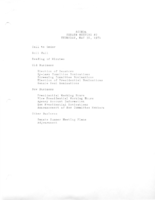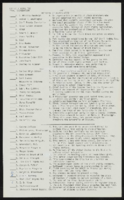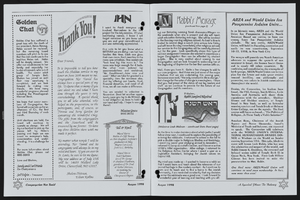Search the Special Collections and Archives Portal
Search Results
Samuel Liddle General Store Records
Identifier
Abstract
The Samuel Liddle General Store Records (1885-1887) are comprised of order forms, inventories, and customer ledgers for Liddle's General Store in Leadville, Nevada. The store was created to provide services to residents and prospectors during a mining boom in White Pine County that lasted from 1887 to approximately 1890. The materials also consist of Liddle's General Store accounts, business correspondence, and transactions, such as wholesale purchases of general merchandise and mining supplies from vendors in Eureka, Nevada, San Francisco, California, and smaller nearby locations. An undated hand-drawn map of the townsite is also included.
Archival Collection
Jacob E. Von Tobel Photograph Collection
Identifier
Abstract
The Jacob E. Von Tobel Photograph Collection contains black-and-white photographs of the pioneer Von Tobel family from 1900 to 1980. The collection includes photographs of the Von Tobel family, early Las Vegas, Nevada buildings and landmarks, and aerial photographs of Las Vegas and surrounding areas.
Archival Collection
Women's Research Institute of Nevada (WRIN) Oral History Records
Identifier
Abstract
The Women's Research Institute of Nevada (WRIN) Oral History Records (1995-2015) are comprised of Dr. Joanne Goodwin's research, communication, and publicity relating to the Las Vegas Women Oral History Project. The records include correspondence, photographs of interview participants, news clippings, and working drafts of transcripts. The records also contain oral history interview documentation for projects in which WRIN and Joanne Goodwin provided assistance and consultation.
Archival Collection
Ham Family Photograph Collection
Identifier
Abstract
The Ham Family Photograph Collection contains five photographic albums primarily featuring images of the Ham family's travels throughout the western United States and Artemus W. Ham Jr. and Betty Ham Dokter during their childhood between approximately 1900-1949. Also included is one photograph used as a Christmas greeting for the Ham family from 1981. The photographs feature locations including Cedar Breaks National Monument, Utah; Grand Canyon, Arizona; and Yosemite National Park, California. The collection also contains photographs of the Ham family at Mormon sites throughout Utah. Lastly, there are postcards and photographs of locations throughout the United States, Germany, and Japan.
Archival Collection
International Food Service Executives Association Records
Identifier
Abstract
The International Food Service Executive Association (IFSEA) Records contain the organizational records from the IFSEA dating from 1916 to 2010. Included are meeting programs and minutes, menus, conference reports and proceedings, financial reports, newsletters, award certificates, scrapbooks, and stewards and caterers records focusing on the hospitality and food service industry. Materials are from both national and regional branches of the organization and include records from the United States military, with whom IFSEA has partnered with since the 1960s. Club artifacts and trophies are also contained in the collection.
Archival Collection

Meeting minutes for Consolidated Student Senate, University of Nevada, Las Vegas, May 30, 1974
Date
Archival Collection
Description
Text

UNLV Ethnic Studies 102 final exam (blank) and Ethnic Studies (ETS 480X) "Seminar in Race Awareness: Minority Groups and Media" assigned readings
Date
Archival Collection
Description
From the Roosevelt Fitzgerald Professional Papers (MS-01082) -- Personal and professional papers file.
Text

Jose Leonardo Martinez oral history interview: transcript
Date
Archival Collection
Description
Oral history interview with Jose Leonardo Martinez conducted by Barbara Tabach and Nathalie Martinez on August 19 and 29, 2020 for the Latinx Voices of Southern Nevada Oral History Project. Session 1: Jose discusses his childhood and what it was like growing up during the Salvadoran Civil War. He recounts the dangers he's faced and how he made his way to the United States after traveling through Guatemala and Mexico. Subjects discussed include: Salvadoran Civil War; Ciudad Arce, El Salvador; Guatemala; Mexico; Los Angeles, California. Session 2: Jose continues his discussion of growing up in El Salvador and the violence he witnessed in the country's army during the 1980s. He also talks about his personal life after moving to the United States and his experiences navigating gang culture in Los Angeles, California. Jose recounts his previous jobs, his schooling, how he met his wife, and his family's move to Las Vegas. Subjects discussed include: El Salvador army; gang violence.
Text
Sandstone Ranch Collection
Identifier
Abstract
The Sandstone Ranch Collection is comprised of bank statements, letters, correspondence, and photographs relating to the Wilson family from 1907 to 1941. The collection includes information about the financial aspect of the Wilson Ranch, later renamed the Sandstone Ranch, located outside of Las Vegas, Nevada. The collection also includes information about the personal lives of those working on the including contracts about grazing cattle, selling cattle, and appropriation of water.
Archival Collection

